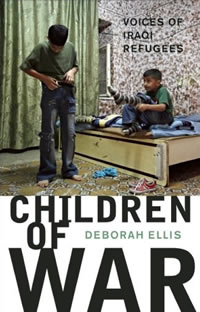Book Notes
 Deborah Ellis, Children of War; Voices of Iraqi Refugees (Berkeley: Groundwood Books, 2009), 128pp.
Deborah Ellis, Children of War; Voices of Iraqi Refugees (Berkeley: Groundwood Books, 2009), 128pp.
Only after finishing this book did I notice on the book's spine that it is intended for "teens." Don't let that stop you from reading it, however. Of all the reading I've done on Iraq, I would count Ellis's book as one of the most disturbing witnesses to the human costs and consequences of war. She's collected twenty-three first person narratives of Iraqi children, ages 8 to 19, who tell what it's like to experience war. She introduces each story with a photo of the child-author, and some basic facts about the war, like the differences among Sunnis and Shias, the consequences of depleted uranium or a phosphorous bomb, or the unique status of the Kurds. Most of the children live as illegal refugees in Jordan.
Hibba, age 16, writes: "People watch war in the movies and they think they know what it's like. They don't know. If they knew, they wouldn't allow it to happen. Only very sick, bad people would want to make war." Or Masim, age 15: "I will never forget it, the bombing time when the Americans came. Some of the explosions were cars and buildings actually blowing up. Other explosions were just a lot of noise — sound bombs to scare us. The people who think up these things are terrible, terrible people." Haneen, age 10, finally found asylum in Canada: "One of the good things about Canada is that there aren't helicopters flying around all the time. I hate that sound."
Iraq Body Count has documented 100,000 civilian deaths in Iraq due to war violence since the 2003 invasion. Other analyses place the figure as high as one million. The UNHCR estimates that almost five million Iraqis have been displaced because of the war. About half of them have fled to Syria and Jordan, and the other half are internally displaced from their homes within the country. These children witness to the severe traumas that these refugees experience. After I finished this book my mind went to Proverbs 31:8–9: "Speak up for those who cannot speak for themselves, for the rights of all who are destitute. Speak up and judge fairly; defend the rights of the poor and needy." In letting these children tell their stories, Deborah Ellis has done just that.


